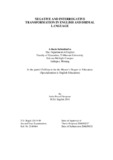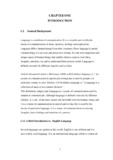Please use this identifier to cite or link to this item:
https://elibrary.tucl.edu.np/handle/123456789/3509| Title: | Negative and Interrogative Transformation in English and Dhimal Language |
| Authors: | Neupane, Indra Prasad |
| Keywords: | Linguistic;Interrogative Transformation;Negative Transformation;English Language |
| Issue Date: | 2011 |
| Publisher: | Faculty of English Education |
| Level: | Masters |
| Abstract: | This research entitled 'Negative and Interrogative Transformation in English and Dhimal Language’ is an attempt to find out the processes of negative and interrogative transformation in the Dhimal language and to compare and contrast them with those in English. The researcher utilized both primary and secondary sources of data. The native speakers of Dhimal language in Urlabari and Rajghat VCDs of Morang district were the primary sources of data and different books, theses, papers and magazines were used as secondary sources of data. The sampling population of the study was forty native speakers of Dhimal language who were selected using judgmental sampling procedure to elicit the required data of negative and interrogative transformation processes in Dhimal language. It is found that the main negative marker of Dhaimal language is ‘ma-’ which is prefixed with the verb. ‘mako’ and ‘manthu’ are also used to negate the sentences of Dhimal language, whereas English negative marker is ‘not’ which is used in all situation. In Dhimal language yes/no questions are formed by adding interrogative particle ‘hāi’ at the beginning of the sentences, whereas English yes/no questions are formed by placing auxiliary verb at the beginning of the sentences. In most of the cases wh-questions are formed by placing wh-word after the subject in Dhimal language, whereas wh-word occurs at the beginning of the sentences in English. This research work consists of four chapters. Chapter one includes preliminary information of languages used in Nepal, an introduction to contrastive analysis, a brief introduction to syntax; an overview of transformation, review of the related literature and objective of the study. Chapter two deals with the methodology adopted for the study. Chapter three consists of analysis and interpretation of the data. Charter four presents findings, recommendations and pedagogical implications of the study. The major findings of the research study are listed thoroughly and some pedagogical implications are mentioned in this cha |
| URI: | http://elibrary.tucl.edu.np/handle/123456789/3509 |
| Appears in Collections: | English Language Education |
Files in This Item:
| File | Description | Size | Format | |
|---|---|---|---|---|
| cover.pdf | 28.5 kB | Adobe PDF |  View/Open | |
| CHAPTER.pdf | 244.12 kB | Adobe PDF |  View/Open |
Items in DSpace are protected by copyright, with all rights reserved, unless otherwise indicated.
